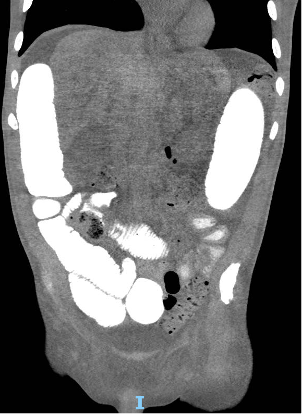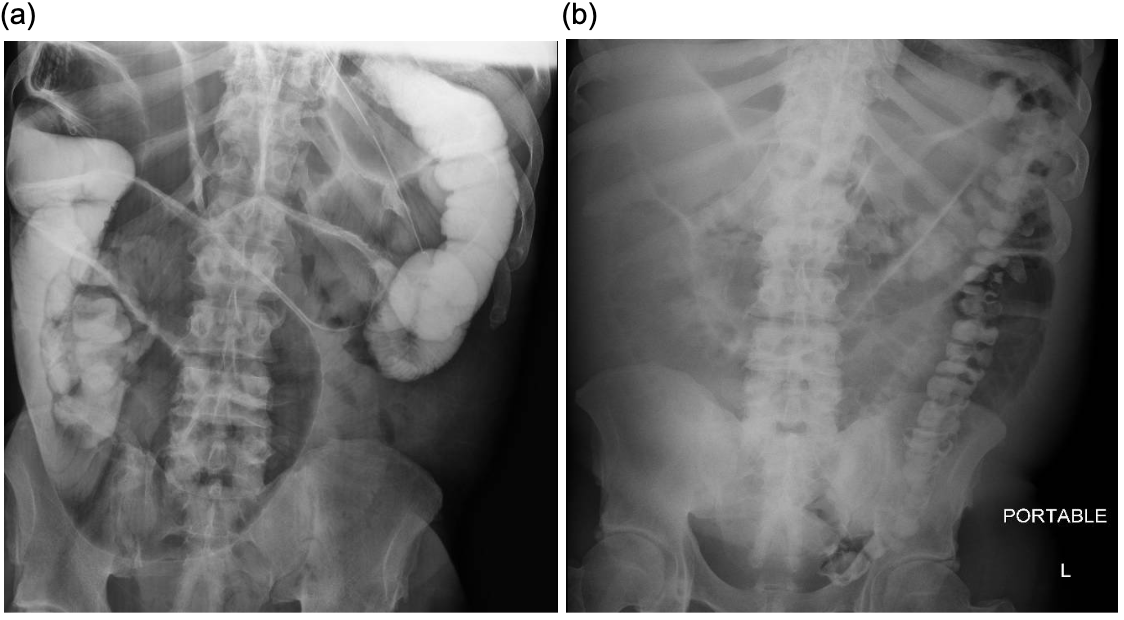Monday Poster Session
Category: Functional Bowel Disease
P2967 - The Last Stand: Intravenous Immunoglobulin Treatment for Recurrent Pseudo-Obstruction Secondary to Scleroderma
Monday, October 27, 2025
10:30 AM - 4:00 PM PDT
Location: Exhibit Hall

Yash V. Bhagat, MD (he/him/his)
NewYork-Presbyterian / Brooklyn Methodist Hospital
Brooklyn, NY
Presenting Author(s)
Yash Bhagat, MD, Gres Karim, MD, Ilan Weisberg, MD
NewYork-Presbyterian / Brooklyn Methodist Hospital, Brooklyn, NY
Introduction: Systemic scleroderma (SSc) is a multi-system connective tissue disorder that rarely presents with small bowel pseudo-obstruction (PO), a serious complication that often leads to bowel resection and total parenteral nutrition causing severe debility and reduced quality of life. The lack of therapies for SSc PO underlies its correlation with increased mortality in comparison to both SSc without PO and idiopathic PO unrelated to SSc. Treatment of the underlying rheumatic disease with intravenous immunoglobulin (IVIG) is an understudied last resort in relieving PO. We present a case of a middle aged man with recurrent admissions for SSc PO that was ultimately resolved with IVIG treatment.
Case Description/
Methods: A 57 year-old man with a medical history of diffuse U3-RNP and anti-Ro positive SSc complicated with chronic recurring PO presented with vomiting and abdominal pain. In the previous 6 months, he had 5 admissions for management of his PO despite trials of prucalopride and erythromycin. Gastric emptying study, endoscopy, colonoscopy, and a diagnostic laparotomy ruled out other causes of his PO. On admission, his CT abdomen showed diffuse small bowel dilation and a focal narrowing in the distal ileum. Conservative management with NGT-assisted decompression resulted in improved passage of enteric contrast into his colon seen on serial abdominal X-rays. After ensuring the patient started passing flatus and tolerated clear liquids orally, we commenced treatment with IVIG (2g/kg over 5 days) in addition to his current erythromycin (3mg/kg every 8 hours) therapy resulting in improved tolerance of oral diet. The patient was discharged with planned treatment with IVIG in the future. On a follow-up visit 4 months after discharge, the patient was found to have had no interim hospital admission, no abdominal pain, and had gained 10 kg of weight.
Discussion: Intestinal PO in patients with SSc is a debilitating and difficult to treat manifestation requiring multidisciplinary input. The limited treatment options are directed towards either promoting gut motility or controlling the underlying inflammatory disease. The use of IVIG in a few case reports has shown to assist with symptom improvement and weight gain, however, no formal study on its efficacy and impact on readmission exists. Our patient demonstrated a positive response to IVIG treatment and a reduction in readmission supporting its use for recurrent SSc PO.

Figure: Figure 1: CT abdomen and pelvis with oral contrast demonstrating small bowel dilation with a focal narrowing in the distal ileum.

Figure: Figure 2: X-ray of the abdomen demonstrating small bowel dilation with minimal passage of oral contrast into the colon prior to initiation of IVIG treatment (a) and with improved and stable PO post-IVIG treatment (b).
Disclosures:
Yash Bhagat indicated no relevant financial relationships.
Gres Karim indicated no relevant financial relationships.
Ilan Weisberg indicated no relevant financial relationships.
Yash Bhagat, MD, Gres Karim, MD, Ilan Weisberg, MD. P2967 - The Last Stand: Intravenous Immunoglobulin Treatment for Recurrent Pseudo-Obstruction Secondary to Scleroderma, ACG 2025 Annual Scientific Meeting Abstracts. Phoenix, AZ: American College of Gastroenterology.
NewYork-Presbyterian / Brooklyn Methodist Hospital, Brooklyn, NY
Introduction: Systemic scleroderma (SSc) is a multi-system connective tissue disorder that rarely presents with small bowel pseudo-obstruction (PO), a serious complication that often leads to bowel resection and total parenteral nutrition causing severe debility and reduced quality of life. The lack of therapies for SSc PO underlies its correlation with increased mortality in comparison to both SSc without PO and idiopathic PO unrelated to SSc. Treatment of the underlying rheumatic disease with intravenous immunoglobulin (IVIG) is an understudied last resort in relieving PO. We present a case of a middle aged man with recurrent admissions for SSc PO that was ultimately resolved with IVIG treatment.
Case Description/
Methods: A 57 year-old man with a medical history of diffuse U3-RNP and anti-Ro positive SSc complicated with chronic recurring PO presented with vomiting and abdominal pain. In the previous 6 months, he had 5 admissions for management of his PO despite trials of prucalopride and erythromycin. Gastric emptying study, endoscopy, colonoscopy, and a diagnostic laparotomy ruled out other causes of his PO. On admission, his CT abdomen showed diffuse small bowel dilation and a focal narrowing in the distal ileum. Conservative management with NGT-assisted decompression resulted in improved passage of enteric contrast into his colon seen on serial abdominal X-rays. After ensuring the patient started passing flatus and tolerated clear liquids orally, we commenced treatment with IVIG (2g/kg over 5 days) in addition to his current erythromycin (3mg/kg every 8 hours) therapy resulting in improved tolerance of oral diet. The patient was discharged with planned treatment with IVIG in the future. On a follow-up visit 4 months after discharge, the patient was found to have had no interim hospital admission, no abdominal pain, and had gained 10 kg of weight.
Discussion: Intestinal PO in patients with SSc is a debilitating and difficult to treat manifestation requiring multidisciplinary input. The limited treatment options are directed towards either promoting gut motility or controlling the underlying inflammatory disease. The use of IVIG in a few case reports has shown to assist with symptom improvement and weight gain, however, no formal study on its efficacy and impact on readmission exists. Our patient demonstrated a positive response to IVIG treatment and a reduction in readmission supporting its use for recurrent SSc PO.

Figure: Figure 1: CT abdomen and pelvis with oral contrast demonstrating small bowel dilation with a focal narrowing in the distal ileum.

Figure: Figure 2: X-ray of the abdomen demonstrating small bowel dilation with minimal passage of oral contrast into the colon prior to initiation of IVIG treatment (a) and with improved and stable PO post-IVIG treatment (b).
Disclosures:
Yash Bhagat indicated no relevant financial relationships.
Gres Karim indicated no relevant financial relationships.
Ilan Weisberg indicated no relevant financial relationships.
Yash Bhagat, MD, Gres Karim, MD, Ilan Weisberg, MD. P2967 - The Last Stand: Intravenous Immunoglobulin Treatment for Recurrent Pseudo-Obstruction Secondary to Scleroderma, ACG 2025 Annual Scientific Meeting Abstracts. Phoenix, AZ: American College of Gastroenterology.
